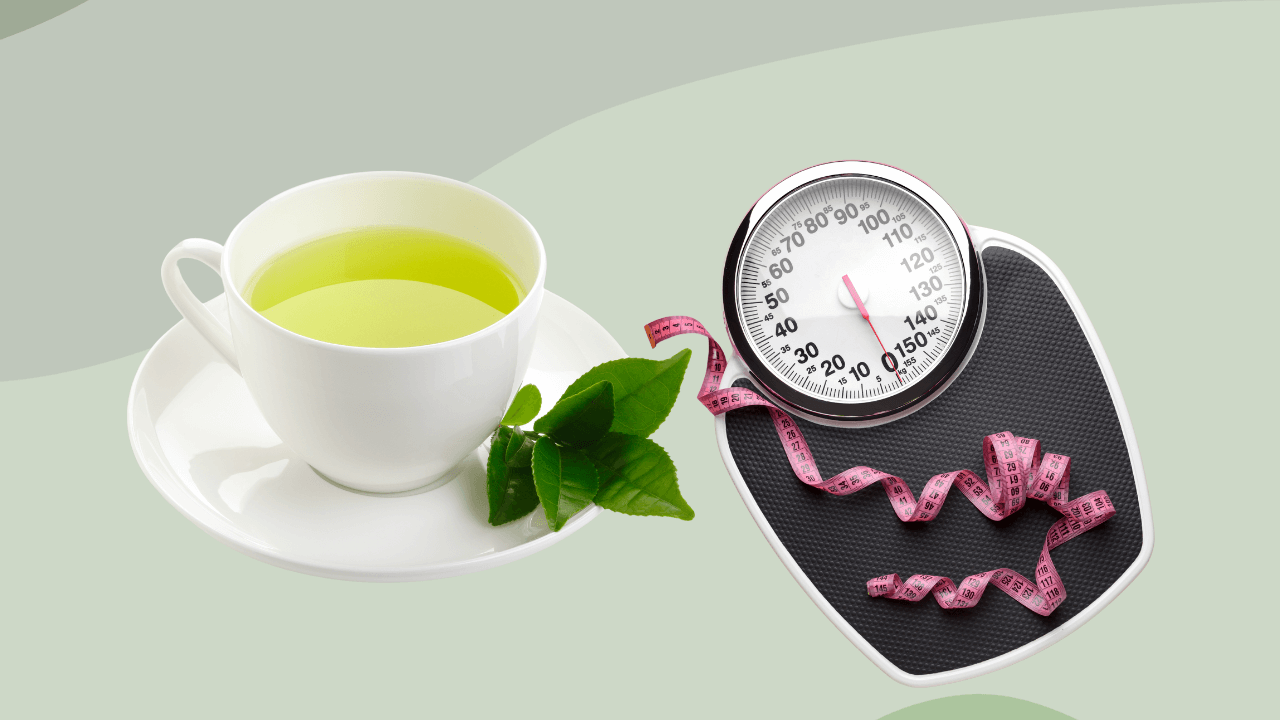

Green tea has been around for a very long time. In ancient Chinese cultures, it has been used for its medicinal properties.
In modern times, people drink green tea for various reasons. Some drink it for its soothing taste, while others believe that it could help them lose weight. Does this ancient brew truly hold the power to shed those stubborn pounds?
I will look at green tea’s history, see what the latest science says, and decide if it actually helps in shedding those extra pounds. Continue reading as I separate fact from fiction about green tea and weight loss.
Green tea leaves are procured from the Camellia sinensis plant. It is produced by steaming the leaves, which helps retain its antioxidants and nutrients. It does not go through the fermentation process. This lack of fermentation allows green tea to keep more of the beneficial compounds found in the plant leaves. Green tea is rich in nutrients, including B vitamins, folate, magnesium, and flavonoids.

Green tea extracts contain concentrated levels of the beneficial compounds found in green tea. Research has shown that decaffeinated green tea extract could increase fat burning during exercise. This increase in fat oxidation occurs with a greater proportion of energy derived from fat stores rather than carbohydrates.
Studies have suggested that taking a green tea extract pill during the menstrual cycle may increase fat oxidation in women. This finding suggests that green tea extracts may have a specific impact on fat metabolism in certain women.
Matcha green tea may have potential effects on weight loss, particularly in increasing fat burning during exercise.
Research has shown that consuming one gram of matcha green tea two hours before exercise significantly increased fat burning, even when the amount and intensity of exercise remained the same. This is due to the unique cultivation process of matcha, where the tea leaves are grown in the shade and carefully dried, resulting in a higher concentration of beneficial compounds.
However, it is important to note that despite the increase in fat burning, most studies do not report significant changes in body fat percentage or overall body composition with the consumption of matcha green tea.
Catechins are antioxidants found in green tea. They have been extensively studied for their numerous beneficial effects on health and weight. Green tea contains various types of catechins, with epigallocatechin gallate (EGCG) being one of the most extensively studied.
Catechins in green tea support weight loss by increasing metabolism. They could increase fat oxidation during exercise, helping to burn more calories. Catechins may support the breakdown of fat cells, potentially aiding in weight loss.
Catechins may help reduce appetite and food cravings. Studies have indicated that green tea catechins may regulate hunger hormones like ghrelin and leptin, helping to control appetite and prevent overeating.
Catechins in green tea have been found to have antioxidant and anti-inflammatory properties. These properties could aid in reducing oxidative stress and inflammation in the body. This not only promotes overall health but also supports weight loss by improving exercise performance and recovery.
Caffeine is a natural stimulant present in green tea. Studies show that caffeine or coffee consumption is associated with better weight management. It may increase exercise-induced fat burning when you exercise on an empty stomach.
L-theanine is known for its calming properties has been found to promote relaxation, and may also reduce stress levels. It could help prevent emotional eating and binge eating, which are common contributors to weight gain. L-theanine might have a positive impact on sleep quality that may indirectly support weight loss efforts.
L-theanine might improve cognitive function by increasing alpha brain waves, which are linked with relaxation and mental alertness.
Properly preparing green tea is important to ensure that you get the maximum benefits from the tea leaves. Here are three key points to consider when preparing green tea:
Must See:
Green tea has been found to offer a range of health benefits beyond weight management. Here are three key benefits:
Though green tea is generally considered safe and beneficial for most people, it is important to be aware of potential side effects.
Green tea contains caffeine, which may cause issues for people who are sensitive to caffeine. High consumption of caffeine may lead to side effects such as jitteriness, increased heart rate, and difficulty sleeping. It is advisable to limit green tea intake if you are sensitive to caffeine.
Another potential side effect of green tea is digestive problems. Some people may experience stomach upset, bloating, or diarrhea after consuming green tea. This may be due to the tannins present in green tea, which could irritate the digestive system.
Green tea may also interact with certain prescribed drugs. Green tea contains compounds that might affect the absorption and metabolism of drugs, potentially altering their effectiveness.
Also Check: Keto Food List For Beginners: Everything You Need To Know
Though green tea may help you lose weight, it is important to understand that depending solely on it for weight loss might not be a good idea.
Weight loss is a complete approach that requires a healthy, nutritious diet, regular exercise, proper hydration, and adequate sleep.
Combining green tea with this approach could accelerate the process of weight loss. Being aware of its potential side effects is also essential.
Consult with a healthcare professional before taking any green tea supplements, especially if you have any underlying health conditions or are taking medications.
Contact us at [email protected] or follow @leafsnap on Twitter! View our Privacy Policy.